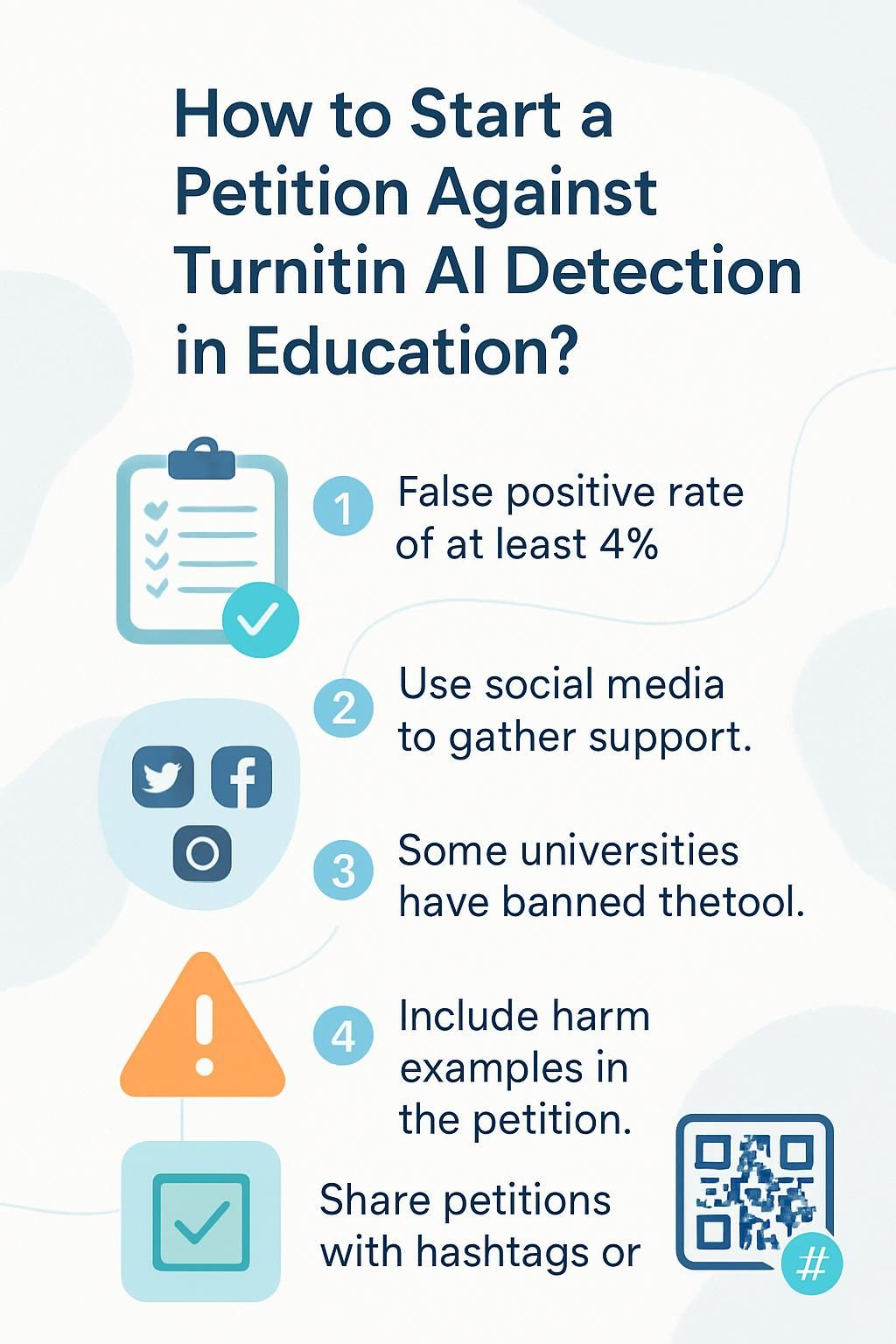Are you tired of being falsely accused of academic misconduct by AI tools like Turnitin? Their AI detection tool isn’t perfect, and even their website admits it. This blog will teach you how to start a petition against Turnitin AI detection in education and make your voice heard.
Keep reading; change starts here.
Key Takeaways
- Turnitin’s AI detection tool has flaws, including a false positive rate of at least 4%, which harms students by wrongly labeling honest work as AI-generated.
- Platforms like social media and forums (e.g., Reddit) can help gather support by sharing stories like Sofia’s from Pompano Beach, where her academic record was unfairly impacted.
- Some universities, such as Vanderbilt and the University of Michigan at Dearborn, have banned Turnitin’s AI tool due to concerns over accuracy, ethics, and fairness to neurodivergent students.
- A strong petition should include clear objectives, examples of harm caused (like Corynn from Raleigh), privacy issues, and requests for institutions to halt AI detector use until it improves.
- Sharing petitions on platforms like Change.org with hashtags (#AIDetectionFlaws) or QR codes makes it easier for others to join in supporting fairer education policies.

Identify the Core Issue
Turnitin’s AI detection has flaws that can harm students. Misjudging work as dishonest impacts fairness and trust in education.
Understand the flaws in AI detection tools like Turnitin
AI detection tools, like Turnitin’s, often make mistakes. They can wrongly flag students for academic misconduct. False positives are a big problem. Studies show some tools have error rates as high as 61%.
Even Turnitin admits their own tool’s false positive rate is around 4%, though many argue it could be higher.
These errors hurt students, especially neurodivergent ones or those in online courses. The system struggles to tell the difference between real writing and generative AI text. It labels innocent work as plagiarism or cheating.
This creates stress and damages trust in academic integrity processes.
Gather evidence of false positives and impacts on students
False positives from Turnitin’s AI detection tools have caused real harm. A student shared how their original draft was flagged as AI-generated, delaying their course and transcript for over a year.
Older essays from 2017 were also unfairly marked as 70% AI-assisted, showing serious flaws in the system.
These errors can wreck academic records and damage mental health. Students face false accusations of academic dishonesty, risking future opportunities like jobs or scholarships. Neurodivergent students might even struggle more with these issues due to biases baked into such tools.
Build a Support Network
Talk to students who have faced issues with AI detectors. Use online spaces like forums and social media to spark conversations.
Connect with students, educators, and advocacy groups
Reach out to students who feel wrongly accused by AI detectors. Sofia from Pompano Beach, for example, shared her frustration about false positives ruining her academic record. Marginalized groups, like neurodivergent students or non-native English speakers, often face harsher consequences.
Use platforms like Instagram and Reddit to create a discussion space where these voices can unite.
Educators are also key allies. Professors at the University at Buffalo reportedly flagged nearly half of their class due to flawed AI detection tools. Advocacy groups focusing on academic integrity and fairness can amplify your message too.
Collect stories and data from them—raw numbers speak volumes in petitions!
Use social media and forums to raise awareness
Post updates about the petition on Twitter, Facebook, and Instagram. Use hashtags like #AIDetectionFlaws or #DisableTurnitinAI to reach a wider audience. Share stories of students impacted by false positives.
Highlight key facts, such as OpenAI scrapping its AI detector in 2023 for inaccuracy.
Join education forums like Reddit’s r/Professors or r/Education. Start discussions about how Turnitin’s AI tool harms academic integrity and fairness. Add links to your petition in comments or threads where relevant users might engage.
Mention names like Kelsey Auman or universities that banned similar tools to make it relatable.
Draft Your Petition
Write your petition like you’re telling a story—clear and straight to the point. Show why this matters with solid facts and real examples.
Clearly state the objective and desired outcome
The petition demands schools like Western Sydney University, UNSW, and others halt Turnitin’s AI detection tool use. This pause would remain until its accuracy is verified. False positives harm students by flagging honest work as plagiarized.
It aims to protect academic integrity and avoid unfair accusations of academic misconduct. The desired outcome includes a formal response from institutions, along with a policy review addressing these flaws.
Provide compelling arguments and data to support your case
False positives from AI detection tools, like Turnitin, harm students. Research shows these tools mislabel original work as AI-generated while missing real cases of misconduct. For example, some universities flag essays with a 35-45% AI score for academic integrity reviews.
This means human-written papers might face unfair scrutiny.
Neurodivergent students often write in ways that confuse AI models. Their unique styles can trigger false accusations of academic dishonesty. Privacy concerns also arise since student work is scanned and stored without consent.
These issues show why relying on such systems risks fairness and trust in education.
Next, focus on spreading the word to gather support for your petition.
Promote the Petition
Spread the word far and wide, using platforms like social media. Rally support by sharing personal stories or examples that hit close to home.
Share through online platforms and educational communities
Post your petition on websites like Change.org to reach a wider audience. Social media platforms such as Twitter, Instagram, and Facebook can amplify your message quickly. Use relevant hashtags like #AIDetectionFlaws or #AcademicIntegrity to draw attention.
Join online groups where students and educators discuss academic tools, including Reddit threads or education forums.
Share real-life examples of false positives caused by AI detection tools. Highlight how this affects neurodivergent students unfairly or burdens them with proving their innocence. Engage actively in educational listservs used by universities and advocacy groups.
Encourage others to speak up about being wrongfully accused due to AI detectors.
Encourage supporters to spread the word
Ask supporters to share the petition using social media, emails, and forums. Platforms like Facebook and Twitter can reach large audiences quickly. Attach QR codes to posters or flyers for easy access.
Sofia from Pompano Beach said QR codes made it simple for her friends to join.
Suggest sharing personal stories with classmates and educators. Corynn from Raleigh shared how Turnitin’s AI detection wrongly flagged her paper, gaining attention in her school group chat.
Personal experiences make others more eager to support the cause.
Universities That Have Banned Turnitin’s AI Tool
Vanderbilt University decided to stop using Turnitin’s AI detection feature. They raised concerns about ethics and accuracy. Tools like this often flag writing as AI-generated, even when it isn’t.
This creates unfair accusations against students.
The University of Michigan at Dearborn also avoids these tools in academic integrity cases. Educators argue false positives harm trust between students and teachers. Many share fears over how such detectors fail neurodivergent students or misread historical texts like the U.S. Constitution as AI-made.
Direct actions build credibility with decision-makers.
Follow Up with Decision Makers
Send your petition to heads of schools or education boards. Ask for their stance on AI detection and its fairness in classrooms.
Send the petition to relevant institutions and administrators
Target schools like Western Sydney University, UNSW, and the University of Sydney. Direct your petition to their academic integrity offices or administrative staff. Address decision-makers who can influence policy reviews on AI detection tools such as Turnitin.
Include clear data in your submission. Highlight false accusations caused by AI detection flaws and how these impact neurodivergent students unfairly. Ask for a formal response about halting Turnitin’s AI tool use until its accuracy improves.
Request a formal response or policy review
Send the petition with a clear request for action. Ask institutions to review their use of AI detection tools like Turnitin, which has admitted its tool is “not a definitive measure.” Highlight flaws such as false positives and bias against neurodivergent students.
Stress the harm caused by unjust academic misconduct claims.
Demand transparency in how these tools affect policies on academic integrity. Push for data-backed changes or detailed explanations if no action is taken. Use evidence to prove that relying solely on AI harms students’ rights and education fairness.
Conclusion
Starting a petition can spark real change. Speak up about AI detection flaws, and show how it harms students. Gather support, share stories, and push for fairness in education. Change begins with strong voices standing together.
For a list of institutions that have taken action against this issue, see universities that have banned Turnitin’s AI tool.




